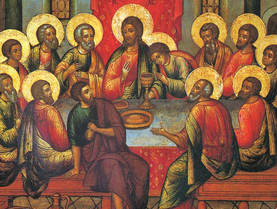
“And while He was still speaking, behold, a multitude; and he who was called Judas, one of the twelve, went before them and drew near to Jesus to kiss Him. But Jesus said to him, ‘Judas, are you betraying the Son of Man with a kiss?’” Luke 22:47-48
Although it has been common for Hollywood productions, like Jesus of Nazareth, to deal very sympathetically with Judas, the Bible is quite clear that Judas was greedy (Matthew 26:14-15); treacherous (Luke 22:47-48); dishonest and hypocritical (John 12:5-6). The Traitor The Bible is very clear that Judas Iscariot betrayed Christ (Matthew 10:4). Judas asked the chief priests: “What are you willing to give me if I deliver Him to you?” Matthew 26:15. The Bible records that the chief priests were delighted at Judas’ treachery (Mark 14:10). Far from Judas being a well-meaning victim of circumstances, the Bible is quite clear that he was a malicious traitor. John’s Gospel plainly says: “Then satan entered into Judas” John 13:27. 
The Apostate
The Bible informs us that the walls of the New Jerusalem will have twelve foundation stones and on them will be written the names of the twelve Apostles of the Lamb (Revelation 21:14). Peter, Andrew, James, John, Philip, Bartholomew, Matthew, Thomas, James the son of Alpheus Thaddaeus, Simon the Zealot… but the name of one of the original twelve Apostles will be missing! That of Judas Iscariot, who betrayed the Lord. The Apostle who became an apostate. The Failure Judas Iscariot is the greatest failure in history. Called to be an Apostle, to be one of the founders of the Church of Jesus Christ on earth, he was presented with the greatest opportunities and highest privileges. Yet Judas failed. Jesus described him as: “The son of perdition …” For up to three years, Judas had the privilege of fellowshipping with the Lord Jesus Christ, listening daily to His instructions, hearing His prayers, seeing Him heal the sick, raising the dead, casting out demons, multiplying food, walking on the water and calming the storm with a Word. Judas went out with the other Apostles to preach and to heal in His Name. Yet, after letting the Lord wash his feet at the Last Supper, Judas went out and betrayed Him for 30 pieces of silver – the price of a slave. No wonder the Lord solemnly declared that it would have been better if he had never been born. Although the light shone all around Judas, there was darkness in his soul. The Thief John’s Gospel records a significant event at Bethany: “Then, six days before the Passover, Jesus came to Bethany, where Lazarus was who had been dead, whom He had raised from the dead. There they made Him a supper; and Martha served, but Lazarus was one of those who sat at the table with Him. Then Mary took a pound of very costly oil of spikenard, anointed the feet of Jesus and wiped His feet with her hair. And the house was filled with the fragrance of the oil. But one of His disciples, Judas Iscariot, Simon’s son, who would betray Him, said, ‘Why was this fragrant oil not sold for three hundred denarii and given to the poor?’ This he said, not that he cared for the poor, but because he was a thief and had the money box; and he used to take what was put in it. But Jesus said, ‘Let her alone; she has kept this for the day of My burial. For the poor you have with you always, but Me you do not have always.’” John 12:1-8 
Greedy, Dishonest and Hypocritical
Here we learn that Judas was greedy and dishonest. He was also hypocritical, pretending a concern for the poor, even while he was stealing from them. Judas, therefore, illustrates an effective sermon on the teaching of Jesus: “And He said to them, ‘Take heed and beware of covetousness, for one’s life does not consist in the abundance of the things he possesses.’” Luke 12:15 Ignoring Warnings No man goes to his doom without warning and Judas certainly received ample warnings: “What shall it profit a man, if he shall gain the whole world and lose his own soul?” Here we find Judas, the treasurer who became a thief and traitor. The Apostle who became an apostate. Covetousness Yet, instead of repenting, Judas only hardened his own heart. The Scripture warns us: “Now godliness with contentment is great gain. For we brought nothing into this world and it is certain we can carry nothing out. And having food and clothing, with these we shall be content. But those who desire to be rich fall into temptation and a snare and into many foolish and harmful lusts which drown men in destruction and perdition. For the love of money is a root of all kinds of evil, for which some have strayed from the Faith in their greediness and pierced themselves through with many sorrows.” 1 Timothy 6:6-10 Resentment Aside from greed, one can also discern jealousy and resentment. Judas was apparently disappointed that Christ did not conform to his expectations of a political Messiah – to free Israel from the hated Romans. Disillusionment When Jesus refused to allow the people to make Him King (John 6:15), many of the Jews began to argue sharply amongst themselves (John 6:52), complaining about the hard teachings of Jesus (John 6:60). Many of the disciples grumbled, turned back and no longer followed Him (John 6:60-66). “Then Jesus said to the twelve, ‘Do you also want to go away?’ But Simon Peter answered Him, ‘Lord, to whom shall we go? You have the words of eternal life. Also we have come to believe and know that You are the Christ, the Son of the living God.’ Jesus answered them, ‘Did I not choose you, the twelve and one of you is a devil?’” John 6:67-70 
Desertion
It is from that time that one can discern that Judas resolved to desert the Lord Jesus and to obtain what financial gain he could get out of it. Malice In the final dark treachery of Judas betraying Him with a kiss, we can see the vindictive resentment that Judas must have felt towards the Lord Jesus. His earlier enthusiasm had apparently, by this time, turned to scorn. There were numerous ways that he could have identified the victim, but that Judas chose to do it with a kiss indicates maliciousness and contempt. Judas kissed the Door of Heaven but went to hell. Jesus declared that He is the Door. He is the Way, the Truth and the Life. Jesus is the Door to Heaven. There is no other door, no other way. Judas Kissed the Door to Heaven – Yet He Went to Hell After walking with Jesus, worshipping with Jesus and working with Jesus for over 18 months, Judas could kiss the One who is the Door to Heaven and yet before that very night was passed descended into a Christless eternity. From Privileges to Perdition Judas Iscariot had the privilege of being brought up in an orthodox religious home, being taught the Law of Moses and the prophecies concerning the Messiah. He was one of the attentive followers and zealous adherents of Jesus of Nazareth. So much so that he was selected to be one of the Twelve and even entrusted with the duties of treasurer. He enjoyed the privileges and advantages of the Gospel. Yet evidently the Gospel light never entered his darkened heart and soul. Judas stands out as a solemn, serious and stark warning, that you can have all the privileges of Christianity, all the advantages of Christianity, all the knowledge of Christianity, all the instruction of Christianity and yet never have a saving faith in the living Saviour and Lord. Position is Not the Same as Possession Having a position in the church does not guarantee possession of eternal life. There is a difference between gifts and grace. Some people have talents, but not the truth. Instead of integrity, Judas epitomizes iniquity and ingratitude. 
Deception
The Lord knew who would betray Him, but none of the other eleven disciples knew. When, at the Passover meal, the Lord declared that one of them would betray Him, nobody said: “Is it Judas?” They asked: “Lord, is it I?” Judas had totally, utterly and absolutely deceived every one of the eleven disciples. Even at that late stage, they did not realise who would be the traitor. Judas had gone with them on their evangelistic tours, he had preached the Saviour’s message and he had been amongst them when they had rejoiced that even the devils were subject to them. Judas provides a painful illustration of the truth, that the church office does not guarantee one eternal salvation. From the Pulpit to Perdition Many fall from the pulpit into perdition. As Dr. Martin Luther warned: God will pave the streets of hell with the skulls of bishops and cardinals – false ministers. Do Not be Deceived On my first visit to Coral Ridge Presbyterian Church, in Fort Lauderdale, Florida, as I was admiring the magnificent building, Dr. James Kennedy admonished me: “Peter, don’t be deceived. Nothing is quite as it appears. I wish I could say that all the members of this church were saved, but I cannot. Nor can I confidently assert that all of my staff are saved. I cannot even be sure that all of my elders and pastors are saved. Why, just recently, our music minister came to Salvation in Christ! Now you must know that a Presbyterian music minister does not begin his career in Coral Ridge Presbyterian Church. This is the summit of his career. I do not want to tell you how many other churches he had been a minister of music in, before coming here and coming to Christ.” I have never been able to forget that sharp warning from Dr. James Kennedy. Judas’s in the Church Indeed, time and again I have been forcibly reminded that there are many like Judas in the church today. “Not everyone who says to Me, ‘Lord, Lord,’ shall enter the Kingdom of Heaven, but he who does the will of My Father in Heaven. Many will say to Me in that day, ‘Lord, Lord, have we not prophesied in Your Name, cast out demons in Your Name and done many wonders in Your Name?’ And then I will declare to them, ‘I never knew you; depart from Me, you who practice lawlessness!’” Matthew 7: 21-23 
Do you know Christ? Does Christ know you?
Has Your Life Been Transformed? Salvation is real. It is radical. It is life-changing and life-transforming. When Jesus comes into a life, old things pass away and all things become new. With the new birth come new desires, new priorities, new purposes, new perspectives, new power, new peace, new principles, new purity, new productivity and new promises in Christ Jesus our Provider and Protector. A False Brother Judas walked with Jesus and yet his heart was far from Him. He knew the teachings of the Saviour, but he did not apply them in his life. He was close to the Light of the World and yet his soul was in darkness. He kissed the Door of Heaven and yet he is condemned to an eternity in the torments of hell. True Repentance Judas also demonstrates the difference between repentance and remorse. Thomas doubted the Resurrection of Jesus, but when confronted with the risen Christ, he fell to his knees and confessed: “My Lord and my God!” Thomas faithfully served the Lord, establishing churches as far as India, where he died as a martyr for Christ. The Difference Between Repentance and Remorse On the same night that Judas betrayed Christ, the Apostle Peter denied that he even knew Him. Yet, after the cock crowed the third time, Peter wholeheartedly repented and went on to serve the Lord faithfully, many years later dying, in Rome, as a martyr for Christ. Repentance leads to forgiveness, freedom, peace and joy. However, remorse falls far short of Biblical repentance. 
The Traitor’s End
Judas declared: “I have betrayed innocent blood!” But there was no lifesaving repentance. Judas went from the Temple to the field that he had long coveted to own and which he had covenanted to buy. He went to the face of the cliff and standing back tied a rope around the base of the tree. The other end of the rope he tied around his neck and then with one mad rush he ran forward and jumped over the precipice, dangled in the air and hung himself. Then the rope broke and his body crashed against the rocks where the Scripture says “all his bowels gushed out.” The salesman who sold his soul ended his life in sorrow. Eternal Punishment But that was not the end of Judas; it was only the end of his life on earth. It was the opening of the dark door into his doomed eternity. Yet, just a few hours before, he had kissed the very Door of Heaven. There is a Way to Hell from the Very Door to Heaven Pilgrim’s Progress ends with a story of a man who, without going through the narrow gate, without bowing before the Cross of Calvary, came to the gates of the Celestial City and was thrown, from there, into hell. John Bunyan notes that he learned that there is a way to hell, even from the very door of Heaven. This was certainly true for Judas. You know the Gospel. Perhaps you have served in the church for years. But the question is: Are you going to the same hell to which Judas Iscariot has been condemned? Have you come to the Cross? Have you wholeheartedly repented of all of your sins? Are you taking up your cross, denying yourself and following Jesus? People are lost, Jesus is the Way. People are deceived, Jesus is the Truth. People are dead, Jesus is the Life. Are you walking in His Way? Do You Love the Truth of His Word? Are you living for Christ? Boycott hell - Repent! Dr. Peter Hammond Livingstone Fellowship P.O. Box 74 Newlands 7725 Cape Town South Africa Tel: 021-689-4480 Email: [email protected] www.livingstonefellowship.co.za www.FronlineMissionSA.org
1 Comment
Eng Khor
4/1/2024 06:54:09 am
Dr Hammond - I don't think the Lord Jesus would ask today's Christians if we are going to betray Him. How about changing the Lord's statement in the upper room to "one of you is a chaff" so that it is more relevant today? This is more generic and it is also applicable to Judas Iscariot. Do you think the apostles would also respond with "Lord, is it I?" Based on Dr James Kennedy comments on his church leaders, it is unclear if he is going to respond with "Lord, is it I?" Unfortunately, we have all been taught the NIV version "Surely you don't mean me, Rabbi?" or worse, "it is not me because I am saved, it must be someone else." There are chaffs even in church leadership as stated by Dr James Kennedy, but if everyone says "it is not me, it must be someone else.", someone is making a false statement. Whereas "Lord, is it I?" response is more self introspective and it paves the way to think of new desires, new priorities, new purposes, new perspectives, new power, new peace, new principles, new purity, new productivity and new promises in Christ Jesus our Provider and Protector. So, if the Lord Jesus make this statement (in a hypothetical scenario) "one of you is a chaff" in a room full of church leaders including you, Dr Hammond, what would be your response? As a follow up question, if you answered "Lord, is it I?" would it jeopardize your salvation or diminish your standing before the Lord Jesus?
Reply
Leave a Reply. |
False ReligionsArticles
All
Archives
June 2021
|


 RSS Feed
RSS Feed